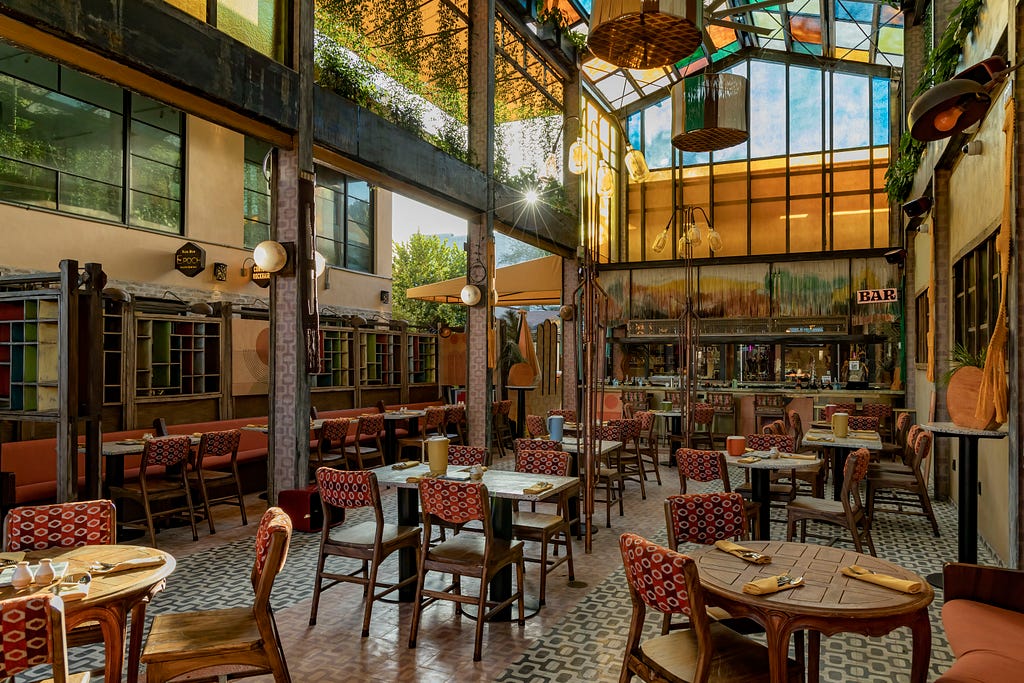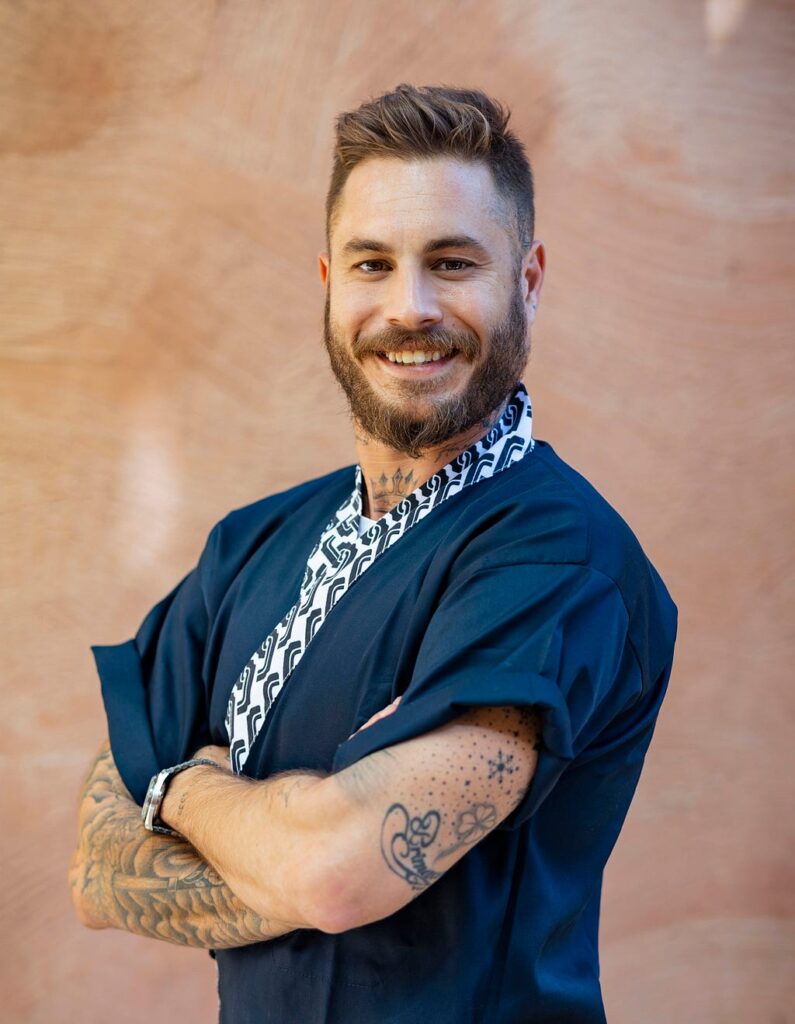An Interview With Martita Mestey
Experience is everything in this industry. Start as young as you can. Take your time and be patient, and success will come.
As a part of our series about “5 Things I Wish Someone Told Me Before I Became a Restaurateur”, I had the distinct pleasure of interviewing Tom Aviv.
Flavor rebel Chef Tom Aviv has become a sensation in the international culinary community Born and raised in Tel Aviv, he broke onto the food scene after his incredible win of MasterChef Israel in 2016 with no formal culinary training. From there, he founded multiple successful restaurants in Israel and Morocco. He recently made his stateside debut with his restaurant Branja in Miami. Chef Tom Aviv continues to impress the culinary community, not afraid to take risks and incorporate classic spices in completely unexpected ways.
Thank you so much for doing this with us! Our readers would love to ‘get to know’ you a bit. Can you share with our readers a story about what inspired you to become a restaurateur?
I grew up in kitchens — my parents had a very successful restaurant in Tel Aviv called Picasso — but I had never had any formal chef training or real restaurant experience. In fact, my parents had warned me not to become a restaurateur, as it is a challenging field to go into.
I avoided the industry for a while because of this warning from my parents. Then, in 2016, an opportunity presented itself for me to be a contestant on Masterchef Israel, so I thought, “Why not?” My parents encouraged me to audition but joked that it would “go by fast” as I had no culinary training and likely wouldn’t make it far in the competition.
I went on to win that season of Masterchef Israel. It felt like it was my destiny to go into the business, and that there weren’t any other industries that I should pursue as a career. I decided to open my first restaurant, and then, after that restaurant’s incredible success, I opened several more.
Do you have a specific type of food that you focus on? What was it that first drew you to cooking that type of food? Can you share a story about that with us?
Israeli-style food is definitely my typical cuisine, and at the core of the dishes I create, but I like to call my kitchen a “kitchen in progress.” I am inspired by memories when I’m creating new recipes. Memories from my travels, weekends I’ve spent at friends’ houses, childhood memories cooking with my mother, the family restaurant Picasso, etc., all contribute to my cooking.
As my travels and experiences have taken me across the globe, the dishes I create pull inspiration from a variety of countries and cuisines, while having an underlying Mediterranean and Middle Eastern touch.
I am particularly influenced by the simple way of cooking Italian food — my first restaurant Coco Bambino was Italian with an Israeli touch.
Can you share the funniest or most interesting story that happened to you since you became a restaurateur? What was the lesson or take away you took out of that story?
My first restaurant, Coco Bambino, was a very lively restaurant, so the vibe over time shifted to nightlife and dancing.
One night, I closed down the restaurant and found one of my clients asleep on the floor after a fun night. I woke him up and called him a cab, but this lesson and advice is that anything can happen in this industry and to expect the unexpected (and to pace yourself)!
Can you tell us a story about the hard times that you faced when you first started your journey? How did you overcome this obstacle?
I think in “big picture,” and really enjoy the creative elements of this industry. For me, the biggest obstacle when I first started out was the more practical knowledge required to succeed in the restaurant business. I am a dreamer, so thinking up and creating new dishes is something I really love, so practicality has always been a challenge for me.
As I had no formal training, when I first started out, I was unaware of just how big of an undertaking it is to take an idea and make it into something you can sell. The logistical and operational elements of a restaurant, like how to build a kitchen and how to create food in mass production, were something I didn’t even know how to approach.
It took me about a year to grasp the practicalities of food service, and even now I am still perfecting it. Luckily, I have surrounded myself with a great team that has expertise in elements like kitchen operations, finances, etc. to help make our restaurants a success.
In your experience, what is the key to creating a dish that customers are crazy about?
The key is to think of a dish that you would enjoy eating. There are times when you may be tempted to create dishes that you personally do not like, because you think it will sell. I don’t think there is room to compromise on this: You need to like the food you make if you want your customers to be crazy about it too.
For example, my partners in Israel wanted to put chicken wings on the menu, because they are popular, but I don’t eat wings — so I won’t sell them. A lot of times we think of the client first, but my suggestion is to go with your gut.
Personally, what is the ‘perfect meal for you’?
One meal that will always stay in my head is every ceviche I ate in Peru. Ceviche with Leche de Tigre is one of the dishes that made me fall in love with cooking. A properly prepared ceviche offers a perfect blend of so many flavors and textures.
Where does your inspiration for creating come from? Is there something that you turn to for a daily creativity boost?
The key is to eat. When I need to think, I cook for myself and I start to eat. When flavors mix, my creative ideas and thoughts start to run wild.
Are you working on any new or exciting projects now? What impact do you think this will have?
After success in Israel and Morocco, this year I opened my first ever restaurant in the United States, Branja. It’s been very exciting tapping into a new market and opening up Branja’s cuisine to a new demographic and variety of diner.
Branja’s menu pulls inspiration from around the globe, while incorporating the signature spices and flavors of generational Israeli recipes. Our signature dishes are intentionally light and designed for sharing around the table with your friends and family. We also offer a unique variety of specialty cocktails made with homemade syrups that pair perfectly. It was very exciting to dream up Branja, which we turned into a real cultural expedition.
When guests enter, they feel like they are stepping back in time to ’70s Tel Aviv thanks to the restaurant’s distinct retro design and warm pastel colors. Branja’s interior and exterior design is a cross between Tel Aviv’s iconic indoor-outdoor train station structure and a cathedral structure with ancient Synagogue seating, along with our outdoor mural of retro art vignettes by Tel Aviv-based artist Paul Curran, that represents the city’s neighborhoods and markets.
The name Branja is Hebrew slang, originating from the word for tree branch, that translates to “a circle of friends,” and we designed Branja to offer an exclusive setting to share plates and explore new flavors. I’m excited to launch a “chef’s counter” kitchen experience later this year as an intimate way to experience our restaurant. My dream with the space is to aim for a Michelin Star.
What advice would you give to other restaurateurs to thrive and avoid burnout?
It’s easy to let this business become your whole life. Something that I’ve recently learned, and started incorporating into my own daily routine, is to know when to stop, when to go home, when to rest, and when to stay awake — it’s all really important.
To avoid burnout, you need balance. Don’t spend your entire existence in the restaurant. Find something to take your mind away from it. Good sleep and a hobby apart from cooking is crucial. Also, many chefs can fall into unhealthy habits — like overdrinking — staying on top of your health and avoiding these habits can help you feel better physically and mentally, and stay motivated.
For me personally, athletic training is not only a great hobby that gets me out of the kitchen, but it helps me stay healthy and active.

Thank you for all that. Now we are ready for the main question of the interview. What are your “5 Things I Wish Someone Told Me When I First Started as a Restaurateur” and why?
1. Experience is everything in this industry. Start as young as you can. Take your time and be patient, and success will come.
2. Understand the financial elements of this business. There’s a lot to consider outside of the creative aspects of the culinary industry. I wish I knew how to save money when I started. In the first few years, I spent a lot of money without even thinking. Paying close attention to finances and making smart financial decisions will ensure your restaurant’s long term success.
3. Repetition is what helps you get ahead. Looking back, I wish I’d known that although this work can sometimes feel repetitive, the repetition is what leads to greatness. The restaurant industry is all about consistency and doing the same thing every day to your best ability to ensure the highest quality product.
4. Running a restaurant is time consuming. I love what I do, and there’s no other career I’d rather pursue, but I wish someone had told me how much you have to sacrifice your private life to deal with this business.
5. Last, and most importantly, your team is crucial to your success. You are only as strong as the partners you work with. I am fortunate to have an amazing team that helps me with every aspect of my business. This has been critical not only for our restaurants’ success, but how much I’ve enjoyed working in this industry.
What’s the one dish people have to try if they visit your establishment?
If you come to Branja, you have to try the Fishwarma. It’s our most popular dish, and for good reason. It’s a flavorful, well-rounded dish that really explains the concept and the environment that you are in at Branja. Our spin on the classic Middle Eastern dish shawarma, it’s a fish mélange with Jerusalem spices, pine nuts, paprika oil, tahini and mango amba syrup.
You are a person of enormous influence. If you could inspire a movement that would bring the most amount of good to the most amount of people, what would that be? You never know what your idea can trigger.
If I could inspire a movement in the industry and beyond, it would be normalizing in-depth knowledge of practical financial skills. How to calculate your steps,understanding how taxes work — the kind of knowledge you need in real life that you don’t get in school. I think we always learn about it too late. I’d love to help create a movement that encourages people to be educated on these topics at a young age so they are set up for success as they head into their careers.
Thank you so much for these insights. This was very inspirational!
Tom Aviv Of Branja: 5 Things I Wish Someone Told Me Before I Became a Restaurateur was originally published in Authority Magazine on Medium, where people are continuing the conversation by highlighting and responding to this story.
